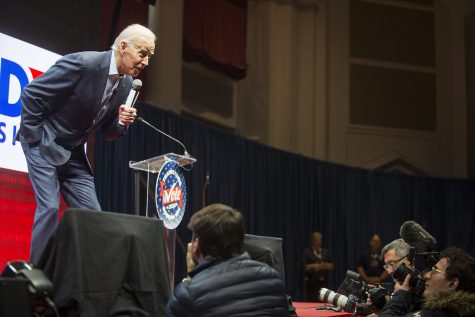Opinion: With Netflix theatrical releases, the future of cinema lies in our Wi-Fi connections
As more films such as Marriage Story share a theatrical release with its streaming service, the role of movie theaters in film is becoming obsolete.
ASSOCIATED PRESS
December 9, 2019
Instead of going to the theater — which is usually how one of my pieces start — I lounged on the floor of my apartment with teddy bear slippers watching Marriage Story. Despite the comfort of home and the privilege of pausing for bathroom breaks and snack refills, I was left with an uneasy feeling about the state of cinema.
As a part of a recent trend, Marriage Story isn’t the first movie to share a theatrical release with its streaming service debut. In fact, it’s just another film that follows the pattern of being able to watch brand-new Oscar contenders from the couch — civilized clothing optional, of course.
Other Netflix titles with a similar situation include The Irishman and Dolemite Is My Name, plus recent movies with contracts through Amazon Studios such as Manchester by the Sea. Some of these films are simultaneously released and others are available a few weeks after being shown in theaters, but they all have an incredibly limited window during which movie lovers can see the story unfold on the big screen.
According to the Internet Movie Database, Marriage Story is the first Netflix film to be granted the longest run of 30 days in theaters. To me, this seems like a ridiculously short amount of time — especially for those who don’t have a Netflix or Amazon Prime account.
Heck, I even recall being incredibly upset when I missed the mediocre film Blinded by the Light in theaters. I swear it had to of been only a couple of weeks before the easily entertaining story of Bruce Springsteen’s music was whisked away to the magical land of DVD production.
Some may argue that it’s a good thing for films to be so accessible, allowing more people to enjoy the artform due to financial reasons, mobility or even just the struggle of finding a theater time that works with our hectic schedules. Others, such as renowned directors Christopher Nolan and Stephen Spielberg, have strong opinions in regard to the infiltration of streaming services into the Hollywood arena.
Speaking to IndieWire, Nolan said, “Netflix has a bizarre aversion to supporting theatrical films. They have this mindless policy of everything having to be simultaneously streamed and released, which is obviously an untenable model for theatrical presentation.”
Spielberg took it one step further in an interview with ITV News: “I don’t believe that films that are just given token qualifications in a couple of theaters for less than a week should qualify for the Academy Award nomination.”
But whether or not it’s good or bad — for me as an old soul or for directors hoping to win another golden statue — I have to believe that society can come to the same conclusion. This new development in media consumption means an exceptionally diverse future is before us, and it’s coming faster than I can gently remove my cat from sitting in front of a laptop screen.
Columns reflect the opinions of the authors and are not necessarily those of the Editorial Board, The Daily Iowan, or other organizations in which the author may be involved.


















